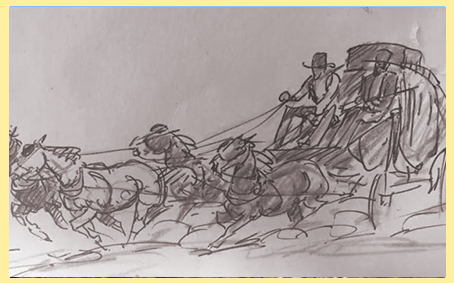Treasure Stories
by James M Deem
Lost Treasure of the Bighorn River
Missing Treasure of Clifford, Colorado

Back to Main Treasure Stories

Other Recommended Treasure Books
Criminals of all kinds have stolen money and, fearing capture, buried it to speed their escape. They intended to come back to recover it later, when the coast was clear. Sometimes their plans were thwarted by a long prison term and a failing memory. Others were killed before they could return. As a consequence, many criminal treasures have yet to be found.
One reported treasure was buried in 1862 by a gang of bandits who stole more than $100,000 in army payroll money.  As with most treasure tales, this story has many versions, including the one that follows.
As with most treasure tales, this story has many versions, including the one that follows.
These robbers were already notorious for crimes they had committed in Sacramento, California, in 1847. By 1862, though, they had moved to eastern Colorado and were living quiet lives as farmers, sheepherders, or cattle ranchers. Still, they decided to join together for one last robbery: a poorly guarded U.S. Army payroll headed for Denver. They planned their final robbery carefully, intending to divide the money and head east, most likely to Chicago.
Their plans were ruined, however, when they found that the stagecoach was accompanied by four armed guards. They grabbed the payroll, but only two of the gang survived the shoot-out and they were quickly pursued by a posse. Rather than travel with such a heavy quantity of gold coins, the two robbers decided to bury them. A few miles east of Clifford, Colorado, they dug three shallow trenches in a circular formation. They filled the trenches and packed the earth on top to make it look as if three people had been buried in shallow graves. A rock resembling a tombstone was placed on each mound. On two of the stones, they chiseled their names and the date "1847." They carved the word "unknown" on the third stone. Exactly why they went to the trouble of preparing three graves is unknown, but perhaps they hoped that the posse would think they had been killed in a gunfight. Finally, at the center of the circle, they dug a large hole in which they buried their loot in three Dutch ovens. Then they departed.
No one would ever have known about the treasure if a stranger from Chicago had not come to Clifford in 1884 and found a place to stay with sheep rancher James Will. The man spent most of his time walking through the barren prairie east of town. When he could not find whatever he was looking for, he related the story of the payroll robbery and the two surviving bandits to James Will and left town for good.
Neither Will nor most of Clifford's residents put much stock into the tale — until May 1931, when George Elkins found a stone inscribed "1847"; some words also seemed to be carved in the stone, but exposure to the elements had made them illegible. Treasure seekers dug far and wide but did not discover any cache — or the other two stones — in the area.
However, in November 1934, another stone was found by Tom Hatton. This stone read: "D. Grover and Joseph Fox-Lawe — Aug. 8, 1847." People assumed that these were the names of the two robbers, but more treasure hunting did not turn up the gold.
Although one of the robbers may have returned and found the money, many people believe that the stolen payroll is still buried near Clifford. According to author Perry Eberhart, who has written about the cache, a careful treasure hunter might find the metal pots containing a fortune in gold on one of the hills that lie east of Clifford.
Of course, anyone finding the treasure would be unable to keep it legally. But this hasn't stopped many treasure trackers from trying.

Laws on Criminal Treasure
Stolen property belongs to the original owner, if there is proof connecting the property to the robbery. If someone finds the Clifford treasure, the U.S. Army would be able to claim the payroll legally as long as it could prove that the coins were part of that payroll. In one case, a boy in Cleveland,Ohio, who found close to $100,000 in currency buried in his backyard, was not allowed to keep it because the serial numbers on the bills indicated that it had been stolen in a bank robbery; the money was returned to the bank.

Copyright © James M. Deem. Taken from How to Hunt Buried Treasure (Houghton Mifflin, 1994). All rights reserved.
